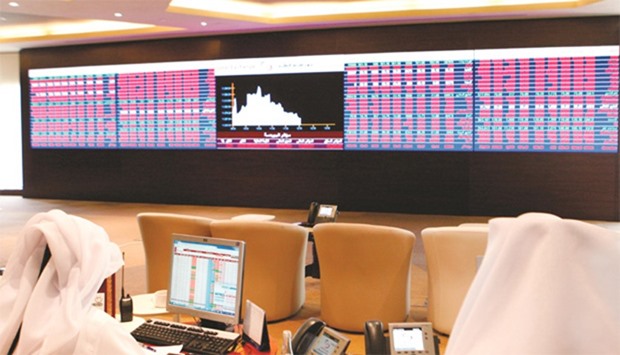Local retail investors’ substantially higher net selling and lower buying support from non-Qatari individuals led the local bourse shed 0.61% during the week which saw the QSE indicate potential for a higher weightage in the MSCI compared to the present 0.8%.
Nevertheless, Saudi Arabia saw its bourse vault 2.53%, Bahrain (0.5%), Muscat (0.45%), Dubai (0.43%) and Kuwait (0.1%), while Abu Dhabi fell 0.44% during the week which saw a rebound in global oil market significantly lift the sentiments of domestic industrial sector with Qatar's producers price index expand about 4% in the second quarter of this year compared to the previous quarter.
The QSE also witnessed the highest year-to-date losses at 6.85% compared to 2.44% in Bahrain, 1.74% in Kuwait, 1.66% in Saudi Arabia and 0.79% in Abu Dhabi; whereas Dubai and Muscat gained 5.49% and 2.13% respectively.
Stronger profit booking pressure especially in the telecom, realty, transport and consumer goods fuelled the bearish sentiments on the QSE during the week which witnessed Qatar Central Bank aver that the banking sector remains "healthy" on adequate capital ratios and low loan delinquency.
Islamic stocks fell faster than the conventional scrips during the week which featured a Credit Suisse research that showed Qatar had the highest average wealth per adult of $161,700 in the Middle East and North Africa in mid-2016, far higher than the region's and global average respectively.
Micro and large cap equities were at the receiving end during the week which saw Bank of America Merrill Lynch sound optimistic on a deal in the Organisation of Petroleum Exporting Countries’ meet on November 30 but said it may necessitate further compromise.
Trade turnover and volumes were on the decline during the week which witnessed telecom, banking and real estate sectors together constituted about 82% of the total volumes.
In volumes, telecom sector constituted 34% of the total, followed by banks and financial services (30%), realty (18%), industry and transport (6% each), consumer goods (5%), and insurance (about 1%) during the week which saw QIIB expecting approval for its joint venture bank in Morocco.
In value, banks and financial services’ share was 46%, followed by telecom (13%), industrials, consumer goods and real estate (11% each), transport (6%) and insurance (2%) during the week which saw an Ernst and Young study that said the domestic mutual fund industry in the Gulf Cooperation Council (GCC) has "failed" to develop and evolve across the region and their assets under management not only remain small relative the size of the regional economy but also face higher redemptions.
Opening the week marginally stronger at 9,781 points, the market was on winning streak, albeit at lower levels, to reach a high of 9,783 points on Monday. Thereafter, the market was gripped by profit booking and overall it settled more than 60 points lower during the week.
The 20-stock Total Return Index and All Share Index (comprising wider constituents) fell 0.61% each and Al Rayan Islamic Index by 0.88% during the week, which saw insurance, industrials and banking register faster declines in trade volumes.
Telecom saw its index plummet 2.16%, real estate (1.7%), transport (1.68%), consumer goods (1.03%), insurance (0.94%) and banks and financial services (0.21%); while industrials gained 0.45% during the week.
Market capitalisation eroded more than QR3bn or 0.65% to QR524.88bn with micro, large and midcap equities melting 1.14%, 0.55% and 0.23% respectively, while small caps were up 0.04% during the week.
Small, mid, micro and large cap stocks have reported year-to-date losses at 15.43%, 10.33%, 9.22% and 4.33% respectively.
Of the 44 stocks, as many as 24 fell, while 15 rose, four were unchanged and one was not traded. Seven of the 13 banks and financial services, five of the nine consumer goods, all the four realty, the three transport and the two telecom, one of one of the eight industrials settled lower during the week.
About 56% of the stocks were in the red with major loser being Gulf Warehousing, Vodafone Qatar, Qatari German Company for Medical Devices, Al Meera, QNB, Barwa, Ezdan, Mazaya Qatar, Ooredoo and Qatar Insurance.
Nevertheless, Medicare Group, Al Khaliji, Commercial Bank, Doha Bank, Industries Qatar and Aamal Company were among the gainers during the week.
Local retail investors’ net profit booking strengthened considerably to QR119.41mn against QR10.02mn week ended November 17.
Non-Qatari individual investors’ net buying weakened perceptibly to QR15.23mn compared to QR40.1mn the previous week.
However, domestic institutions turned net buyers to the tune of QR85.75mn against net sellers of QR22.55mn the week ended November 17.
Foreign institutions were also net buyers to the extent of QR17.63mn compared with net profit takers of QR7.52mn the previous week.
Total trade volume fell 40% to 24.84mn shares, value by 36% to QR801.43mn and transactions by 30% to 13,136 during the week.
There was 93% plunge in the insurance sector’s trade volume to 0.21mn equities, 91% in value to QR15.55mn and 54% in deals to 472.
The industrials sector’s trade volume plummeted 50% to 1.51mn stocks, value by 56% to QR87.78mn and transactions by 30% to 1,766.
The banks and financial services sector saw 45% shrinkage in trade volume to 7.41mn shares, 2% in value to QR372.12mn and 24% in deals to 4,364.
The real estate sector’s trade volume tanked 43% to 4.4mn equities, value by 42% to QR86.66mn and transactions by 42% to 1,800.
The market witnessed 26% decline in the telecom sector’s trade volume to 8.47mn stocks, 45% in value to QR104.54mn and 41% in deals to 2,312.
The consumer goods sector’s trade volume shrank 11% to 1.35mn shares, value by 35% to QR86.77mn and transactions by less than 1% to 1,572.
However, the transport sector reported 39% surge in trade volume to 1.49mn equities, 52% in value to QR48mn and 15% in deals to 850.
In the debt market, there was no trading of treasury bills and government bonds during the week.


